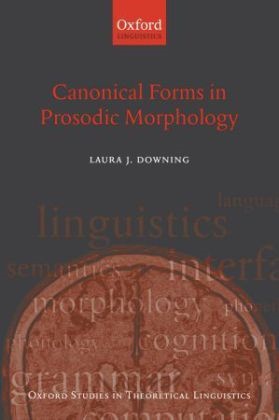Read more
Zusatztext ...this book represents an excellent example of three aspects of theoretical innovation...For this reader, the book has readily achieved its stated goal of wanting to engage and inspire readers to do more work in PM that examines and adopts proposals from morphology. Informationen zum Autor Laura J. Downing is a Research Fellow at the Centre for General Linguistics, Typology, and Universals Research (ZAS) in Berlin where her work focuses on theoretical issues in prosodic phonology and morphology. Her interest in morphologically-conditioned phonology is represented in a volume she co-edited on Paradigms in Phonological Theory (Oxford). Her current research project at the ZAS is concerned with the prosodic expression of focus in Southern Bantu languages. Klappentext This book considers the interaction of morphological and phonological determinants of linguistic form and the degree to which one determines the other. It considers the operation of canonical forms! the invariant syllabic shapes of morphemes and the defining characteristic of prosodic morphology. Dr Downing presents an original theory which she tests on data from a wide variety of languages. Her book will be of central interest to scholars and advanced students of phonology and morphology! and of linguistic theory more generally. Zusammenfassung Prosodic morphology concerns the interaction of morphological and phonological determinants of linguistic form and the degree to which one determines the other. This is the first book devoted to understanding the definition and operation of canonical forms - the invariant syllabic shapes of morphemes - which are the defining characteristic of prosodic morphology. Dr Downing discusses past research in the field and provides a critical evaluation of the current leading theory which, she shows, is empirically inadequate. She sets out an alternative approach and tests this in a cross-linguistic analysis of phonological and morphological forms over a wide range languages, including several not previously been studied from this perspective. Prosodic morphology has been the testing ground for theoeretical developments in phonology over the past twenty years, from autosegmental theory to optimality theory. This book will be of central interest to specialists in phonology and morphology, as well as to advanced students of these fields and of linguistic theory more generally. Inhaltsverzeichnis 1: Introduction 2: Prosodic Hierarchy-Based Templates 3: Morpheme-Based Templates 4: The Role of Phonology in Defining Canonical Form in MBT 5: Questions for Future Research and Conclusion References ...

